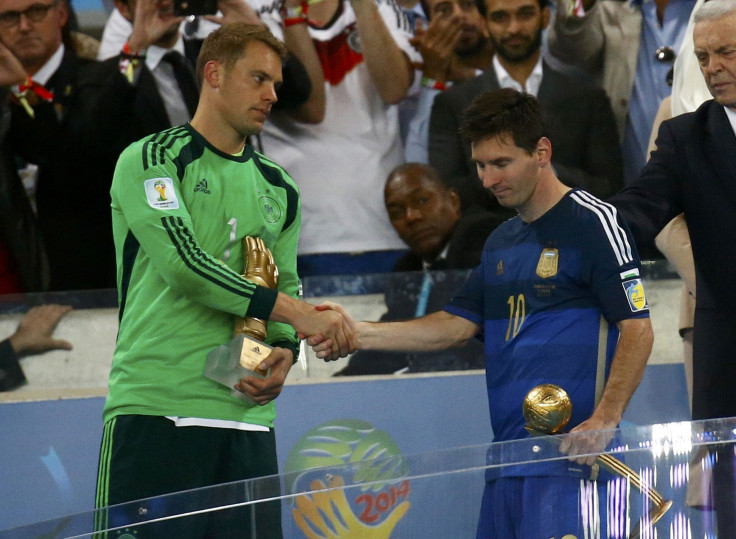World Cup 2014 Awards: Did Lionel Messi Deserve The Golden Ball? Roundup Of Golden Boot, Best Goalkeeper And Best Young Player Winners

Germany took the ultimate prize at the climax of one of the best ever World Cups, but there was also the usual bevy of individual awards handed out. Always liable to provoke much debate, here’s who FIFA deemed worthy of recognition and whether they were deserving winners.
Golden Ball: Lionel Messi
There was much negative reaction to Messi collecting the award for best player after his Argentina side lost to Germany in the final, with Diego Maradona even chiming in and criticizing the decision. Certainly it is a debatable choice, but not nearly as controversial as some have tried to make out. Messi scored four goals in the group stage and, while he failed to add to that tally in the knockout phase, he continued to produce decisive moments for his team in both the Round of 16 and quarterfinal. In the semifinals the Netherlands based their whole strategy around stopping the Barcelona star from playing. It was only in the final where he truly disappointed, looking drained and missing a chance that, had he taken it, would have seen him become the tournament’s undisputed best player and perhaps the greatest player of all time. That illustrates the weight of pressure on Messi’s shoulders and he has also been unfairly judged by his own amazingly high standards in a tournament that saw him create more chances than any other player.
Perhaps a member of the victorious Germany team should have won it, but not one had the same influence as Messi. And it is somewhat fitting that a German didn’t claim the biggest individual award after a triumph based on team effort rather than individual brilliance. Of their leading candidates, Philipp Lahm and Toni Kroos didn’t excel until the latter stages and Bastian Schweinsteiger’s impressive but non-eye-catching work was always unlikely to be recognized. Thomas Müller’s five goals garnered him second place, but again he didn’t carry his team like Messi. Manuel Neuer, though, having been brilliant throughout and occasionally crucial, can perhaps count himself unlucky not to follow in the footsteps of compatriot Oliver Kahn and become the second goalkeeper to win the award. With six goals and a host of moments that put smiles on watching faces, James Rodríguez could well have triumphed had Colombia gone beyond the quarterfinals.
Golden Boot: James Rodríguez
Rodríguez did walk away with the one award about which there can be no debate, having finished top scorer. Even more impressive is that Rodríguez hit the highest number of goals since Brazilian great Ronaldo in 2002 having played just five matches. There’s also the small fact that he wasn’t even playing as a forward. Coming into the World Cup all the talk surrounding Colombia was of the loss of their prolific striker and talisman Radamel Falcao. But Falcao’s absence allowed Rodríguez to be given a central playmaking role and he responded not just with scintillating flair and incisive passing -- he also registered two assists -- but by replacing Falcao’s goalscoring prowess as well.
The 23-year-old Monaco player catapulted himself to superstar status in Brazil with a full range of goals from finishing off fine team moves from close range to a leading candidate for goal of the tournament with a stunning volley from distance against Uruguay. Winner of the Golden Boot in 2010, Thomas Müller had to settle for second place this time around, but another five goals to take his tally to 10 means it may be only a matter of time before the 24-year-old eclipses teammate Miroslav Klose as the World Cup’s all-time leading scorer with 16.
Golden Glove: Manuel Neuer
There were some exceptional goalkeeping performances over the past month. American Tim Howard was a one-man resistance against Belgium with the most saves ever recorded in a World Cup match. Keylor Navas was a key part of Costa Rica’s dream run to the quarterfinals, looking unflustered throughout. And Sergio Romero, the subject of considerable scrutiny before the tournament due to spending almost the entirety of last season on the bench with Monaco, was near faultless in helping Argentina through to the final. But there can surely be no doubt that Neuer was the pick of the bunch to cement his position as the world’s best goalkeeper.
Not only was the Bayern Munich stopper a constant imposing presence between the posts, but his ability to spot danger early also bailed his high defensive line out of trouble on a number of occasions, particularly in a Round of 16 match against Algeria that could have seen the end of Germany.
Best Young Player: Paul Pogba
In a category limited to those born on or after Jan 1, 1993, there were few standout candidates this time around. Certainly there was no player that grabbed the attention like Thomas Müller in South Africa, Michael Owen in 1998 or the award’s first winner, Pele, in 1958. Paul Pogba’s ability is unquestioned and the dynamic, gifted 21-year-old midfielder could well be a candidate for the Golden Ball award in the future. However, while playing his part in France’s run to the quarterfinals, he did nothing to enhance a reputation built up over two impressive seasons with Italian champions Juventus.
Yet his teammate and fellow nominee for the award, Raphael Varane, was even less deserving, having been at fault for the goal that knocked France out of the tournament. The final contender Memphis Depay did make more of an impact. The 20-year-old PSV Eindhoven winger changed the game in the Netherlands’ favor when coming off the bench in the group stage against Australia and scored again the following game against Chile. But having contributed little to breaking down Costa Rica in his first start of the World Cup in the quarterfinals, he was left on the bench for both the semifinals and third place playoff.
© Copyright IBTimes 2024. All rights reserved.





















